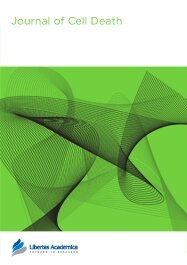

Publication Date: 03 Mar 2010
Type: Original Research
Journal: Journal of Cell Death
Citation: Journal of Cell Death 2010:3 1-11
doi: 10.4137/JCD.S2822

We previously described a caspase-independent death induced in macrophages by a high intracellular burden of Mycobacterium tuberculosis (Mtb). This death, with features of apoptosis and necrosis, releases viable bacilli for spreading infection. Interferon (IFN)-γ promotes survival of macrophages with a low intracellular Mtb load by inhibiting bacterial replication. Macrophages in naïve hosts are unable to restrict Mtb replication following aerosol transmission, but IFN-γ is increasingly present when adaptive immunity is expressed in the lungs ∼2 weeks post-infection. We therefore investigated the effects of IFN-γ on macrophages challenged with Mtb at high multiplicity of infection (MOI). In contrast to the response at low MOI, IFN-γ accelerated the death of heavily infected macrophages and altered the characteristics of the dying cells. IFN-γ increased caspase-dependent DNA cleavage and apoptotic vesicle formation, but it also increased mitochondrial injury and release of LDH and HMGB1 in a caspase-independent manner. Adaptive immunity in tuberculosis (TB), mediated primarily by IFN-γ, has differential effects on Mtb-induced macrophage cell death depending on the intracellular bacillary load. While IFN-γ generally promotes host defense, our data suggest that its effects on heavily infected macrophages could also accelerate necrosis and spreading infection in TB disease.
PDF (2.37 MB PDF FORMAT)
RIS citation (ENDNOTE, REFERENCE MANAGER, PROCITE, REFWORKS)
BibTex citation (BIBDESK, LATEX)

It was my great pleasure to serve as a peer reviewer for the Journal of Cell Death. The review process is fast and efficient. The online access was easy and user-friendly. The editorial staff are friendly and helpful. It was a great experience working with Libertas Academica and I look forward to working with them further.
Facebook Google+ Twitter
Pinterest Tumblr YouTube